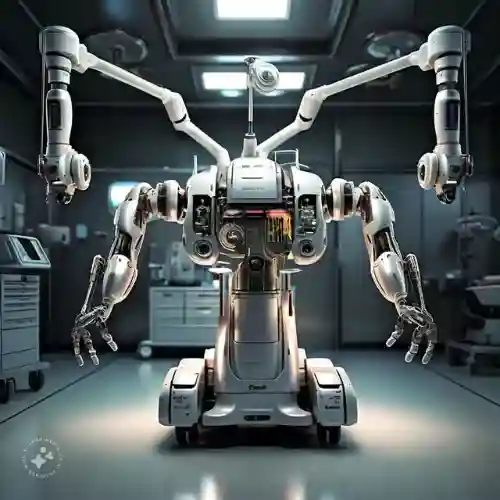Do you want a robot to operate on you? Or just make life easier by taking care of the logistics and paperwork?
Recently, a French surgeon based in Shanghai performed prostate surgery on a Moroccan patient through a Chinese-made robotic system, marking it as the world’s longest-distance remote robotic surgery, with the patient being 12,000 km away from their doctor.
Besides the multi-racial involvement in a patient’s care, what are the first few thoughts that strike you when you read the headline? For me, it was the bravado of using a robot that’s ‘Made in China’. This was immediately followed by a memory of our COVID days, when healthcare workers were the only professionals who were expected to be on the field; if COVID or one of its brethren strike again, we will finally be able to work from home! A third thought was that some desi surgeon sitting in New York must already be planning to break this record by operating on someone in Singapore, 15,000 km away from them. And a final, sobering fourth thought: this needs a stable 5G connection linking the surgical console of one country to the robotic arm in another, but in India, wherever you go, the network doesn’t always follow.
Interestingly, India pioneered telerobotic heart surgery in 2018 when a cardiologist based in Gujarat conducted a coronary intervention from a distance of 32 km using a robotic system. They stuck to a shorter distance; in case something went wrong, one could quickly drive down and fix the problem. The word robot comes from the Czech word ‘robata’, which means ‘labour’; whether it makes the surgeon’s work more or less is still hard to determine. But since its advent in the late 1980s, it’s come a long way with enhanced visualization, superior dexterity, and precision during minimally invasive procedures. Interestingly, the first robot platform used on a human patient was in 1985 to perform neurosurgical biopsies.
I was recently at Spine Roboticon, a conference in Bangalore dedicated to robotic spine surgery. It was ironic that we had to travel from Mumbai to another city to watch surgery being performed elsewhere, that was transmitted to us in the hotel where the meeting was being held. What separates us also eventually binds us together, because we had to come together as a group to discuss the future of this technology. Ten surgeries were performed live on all parts of the human spine, the robot hand being held by the surgeon’s. A presurgical plan was made based on the patient’s CT scan a day prior, and then, on the day of the surgery, by computing various algorithms, the robot positioned itself at various points on the human spine to give us the perfect trajectory to pass screws. Technically, this avoids any inadvertent damage that the human can potentially cause using a ‘free hand’ technique.
How did we operate before the robot was routinely adopted in surgery? That is akin to asking how we drove before Google Maps came around or how we communicated before the cell phone arrived. In my opinion, it was beautiful and charming, but one can wonder as to its efficacy. In my opinion, the cell phone has destroyed communication. Will the advent of technology eventually diminish surgical skill? A robot is not a replacement for a surgeon, because as my teacher used to say, a fool with a tool is still a fool. Proponents of the robot believe that it can only make a good surgeon better.
‘The decision is more important than the incision’ is the dictum for any operation. But will a time come when AI integrated into the robot might overpower human decision-making in choosing what’s best for the patient, when several options are available? AI in the form of doctors are already conducting outpatient clinics in some parts of the world, dispensing medication and treatment advice for basic ailments. It won’t be long before it might be a rarity for a patient to interact with a human doctor; AI can now demonstrate empathy, compassion, and patience too. The dark side of this also needs to be pondered: if AI doesn’t have a solution to your problems, it might just convince you it’s better to die.
Today, we are at a point in our lives when everyone wants a robotic operation. Patients are convinced that if your doctor is using a robot, they will have a better outcome. The doctor is convinced that if they tell a patient, “Hum operation robot se kerenge,” the patient will opt for the surgery. For hospitals, it’s an essential marketing tool. Robotic knee and hip replacements are now as common as knick-knacks available at a local store. The common man, which includes the common doctor, has very little idea of what a robot does, but the general perception is that it could enhance the potential of the surgeon and the potential outcome for the patient, which, in the larger scheme of things, is true. It is also true that it’ll become part of every relevant surgeon’s armamentarium very soon.
Robots in brain surgery enhance precision to target deep-seated lesions, improve accuracy in removing brain tumours, and protect important functional areas of the brain. Robotic exoskeletons for spinal cord injury rehabilitation have gotten paraplegic patients to walk. We must embrace technology, but we must also be free of it – because not all patients will have equal access to it. Should funds be spent on robotic systems if they do not always provide clear benefits over traditional methods? If a robot malfunctions (and this has happened and patients have been harmed), who is to blame – the surgeon, the hospital, or the manufacturer?
Dependence on robotic systems may reduce surgeons’ manual skills over time. It may however enhance the possibility that paramedical staff might end up performing most of the procedure, as everything is so automated. We were under the impression that no matter how advanced technology gets, one will still need a driver to drive a car or a pilot to fly a plane. The first one has been satisfactorily debunked. The second one will soon see fruition. And the third will be when a patient checks into a hospital, gets their surgery done, and leaves without any human interaction. But if I were a medical administrator, I would rather employ a robot for the admission and discharge process, because for most patients, that’s more painful than the actual operation. The Indian robot will also be trained to deal with patients asking for a bed upgrade, and after that, a discount. Obviously, they’ll be Gujju.
While there is so much controversy about this technology, for me, the most confusing thing about the robot still remains whether to pronounce the ‘t’ at the end.





21 thoughts on “The surgical robot”
Well written Mazda! Surprised by your blogging skills 👏 👌
Interesting
Even the pronunciation of the word ‘robot’ has its doubts….
Doc, who’d need a robot with you around.
Extremely well written message. 👏
The times they are a changing…and how fast!
Dearest Dr Mazda sir …….
Very happy to note that you have shifted focus from Mountain Climbing back to Your original Subject of Medical……….
Very well explained the hot Topic of Robotic vs Manual with your special Opinion explaining very well the pros & cons of both…….
Thanks for praising Gujjus for Upgrade – Discount 😩😳 At the end…
Keep on enlightening your Readers with your knowledge & expertise & experience in your writings….😎
God bless Sir 🌹
A good synopsis of +/- of Robo(t) whatever you pronounce. The parting kick ‘gujjus’ was apt not to leave Marwaris behind.
Interesting Dr.
Interesting take on robotics .
AI driven technology has many useful applications , and should be chosen wisely .For deep seated lesions , intricate procedures ,robotics will aid the surgeon’s efficiency . I cannot comprehend how a robotic knee replacement is better than conventional surgery.
Like the driverless Tesla.
The ‘Made in China’ robot doing surgery is fine, but let’s just hope it doesn’t come with a ‘low battery’ warning half way through the procedure! Also, while I’m sold on robots for surgery, but can we also program them to handle the patient’s anxious relatives after surgery?
“Robotic surgery is revolutionizing healthcare with enhanced precision & accuracy. India pioneered telerobotic heart surgery in 2018. While technology is advancing, concerns arise about access, accountability & impact on human skills. A thought-provoking piece on the future of robotic surgery!”
Technology can never replace human touch
Robotic dependencies sound futuristic yet a bit eerie!!!
Superb introduction to Robots in the medical field.
Look forward to more such articles.
Regards
Tozar
Respected doctor for me I would always prefer a human expert taking care of me rather than an iron arm. But I guess I belong to old school ideas. New technologies will come as science in medical field goes ahead. I guess best is to balance both as per personal preference of the patient and type of treatment needed. Good luck to all in need.
Too interesting a read…..I’m a true fan of your articles….such deeply interesting thoughts…..
Dr. Mazda, your piece is a fascinating exploration of the intersection of technology and medicine. It’s both thought-provoking and humorous. Your analysis of the potential benefits and drawbacks of robotic surgery is spot on. A truly enlightening read !!!
Dear Dr. Mazda, your insightful exploration of robotic surgery is both thought-provoking and humorous. You’ve masterfully highlighted the potential benefits and risks of this technology. Your humorous take on the “Gujju” and their entrepreneurial spirit adds a lighthearted touch to a serious topic.
Perhaps a robot could handle the paperwork and logistics, but I’d still prefer a human surgeon with a steady hand and a good bedside manner !!!
Humans & Technology, hands-in-hand, keeps improving the quality of our lives. It’s so true, Dr. Mazda!
My 97-year old Dad, you operated on is a living calculator of multiplication tables, accounting & financial skills – while I, with the help of technology, software & new AI tools, do commercial & Industrial solar engineering designs producing revenues in millions everyday supporting many families.
Now, My Nephrology daughter used to a fully auto driven Tesla one day when driving my simple car struggled to go to airport without her auto driving and no GPS features !!!
Are we depending while benefiting with 5G, 6G, AI, Robotics and humanoids?
Is our lives improving?
Is this like an agriculture & then an Industrial Revolution of 19th century?
I Liked your sense of humor about Gujjus!
Keep up, Doc!
See you soon in India!!
My Regards to your family, Doc!
Wow Robotic surgery? Thanks for this informative very well written article.
I would not trust a robot to do my surgery because you can not blame the robot if the surgery fail.
DR Mazda please take over as I trust you more than anything.
There is noticeably a bunch to know about this. I believe you made certain nice points in features also.